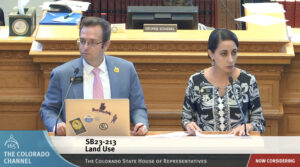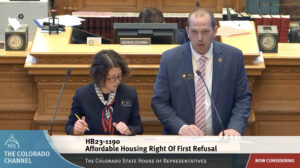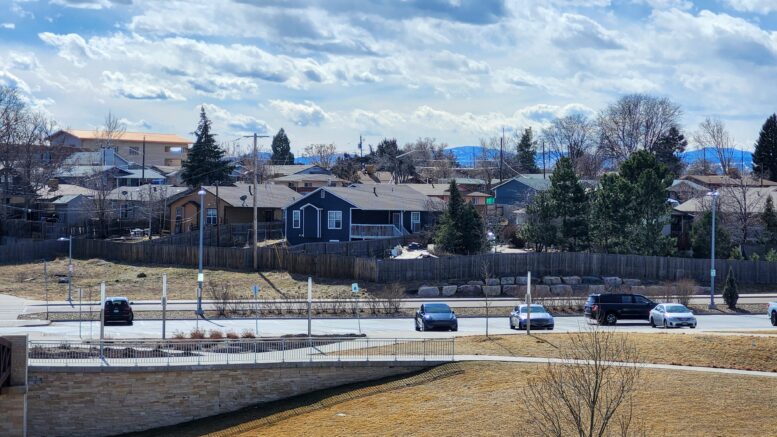Since the May 8 collapse of his first land-use reform bill to spur more housing construction, Gov. Jared Polis has plotted a successor plan involving both incentives and mandates. This week, he and Colorado employers will begin to learn if the new strategy has more appeal.
Several pieces of the new multi-bill housing package already are advancing — a ban on local occupancy limits for unrelated individuals that passed the House, and a bill letting single-family homeowners build accessory dwelling units that’s cleared its first committee. Another bill to require and help fund statewide and local housing-needs assessments remains on the way, as does a competitor bill to it that is all incentive and no mandate and is in tune with desires of Colorado municipal leaders.
But on Wednesday, the centerpiece of Polis’ housing package goes before the House Transportation, Housing & Local Government Committee — House Bill 1313, a beguiling mix of carrots and sticks to grow housing options around transit corridors and job centers. Sponsored by the primary House backers of last year’s failed effort, Democratic Reps. Steven Woodrow of Denver and Iman Jodeh of Aurora, it’s likely to run once again into heavy opposition from local-government leaders arguing it usurps community control.
There are a handful of other bills that have been introduced by both Democrats and Republicans, some offering tax credits for actions like construction of middle-income housing and others banning practices like local minimum parking requirements. And there are bills, scheduled to be heard in the next two weeks, that would affect the state’s nearly non-existent condominium market either by making it more difficult or making it easier to sue builders over construction defects, all of which face difficult first committees despite Polis calling for construction-defects reform.
Governor’s aims with housing package
Polis, in speaking last month with the Colorado Chamber of Commerce board of directors tied his efforts to market conditions, saying that a boost in construction can help to slow the rise of housing costs — if he can remove impediments like local restrictions. And that boost, he and other business leaders have insisted, will help workers afford to live closer to job centers and alleviate the labor shortages plaguing many industries at a time when Colorado’s soaring cost of living is impeding economic development.

Gov. Jared Polis, seated next to Colorado Chamber of Commerce Board Chairman Kreg Brown, discusses his housing plans at a Feb. 15 board meeting.
“Demand is high. That’s not a bad thing. We don’t want to solve it by becoming less desirable,” the Democratic governor said. “We want to solve it by removing artificial constraints in supply.”
The sentiment is a popular one in a state where Jerilynn Francis, chief communications and community partnerships officer for the Colorado Housing and Finance Authority, has estimated the state needs to build 44,000 new units a year through 2030 to meet demand. But the details of the bills will test whether Polis has found a workable solution or has attempted to wrest too much local control once again.
Details of key housing bill
HB 1313 requires communities of at least 4,000 people within metropolitan planning organizations and containing at least 75 acres within designated distances from passenger rail or high-frequency bus routes to create denser transit-oriented communities. Local officials can boost density in these transit centers by allowing up to 40 units per acre throughout or more in specified areas, allowing multifamily residences in commercial or single-family-zoned areas or permitting taller buildings — and must have an administrative approval process for properties of five acres or less.
The proposal — which would affect about 30 jurisdictions, most along the Front Range corridor — comes first with incentives, including a proposed $35 million fund to help cities and counties comply with the bill’s requirements. But if jurisdictions aren’t in compliance by the end of 2026, they could lose the annual roadway allocations that come to them from the Highway Users Trust Fund, and if they’re still out of compliance one year later, the state can begin seeking injunctions.
Woodrow in a news release said the bill would “strategically increase housing options near transit hubs and job centers to address our housing shortage while reducing emissions, air pollution, traffic and vehicle miles traveled.” The Colorado Municipal League, meanwhile, is opposing the bill unless it’s amended, as it has opposed other key pieces of the Polis plan.

Colorado state Reps. Steven Woodrow and Iman Jodeh explain their land-use reform bill to the House during the 2023 legislative session.
Details of other housing bills
HB 1152, which has bipartisan sponsorship, permits single-family-zone property owners in the five areas with MPOs — the Denver area, Northern Front Range, Pikes Peak area, Pueblo area and Grand Junction area — to build ADUs, often called “granny flats.” It also creates an $8 million fund to help residents in supportive jurisdictions build these units via affordable loans, the buying down of interest rates on loans and down-payment assistance.
HB 1007, sponsored by two Democrats, bans local governments from enforcing occupancy limits for non-related residents except to regulate safety and health. Co-sponsoring Rep. Manny Rutinel of Commerce City said that in addition to addressing housing shortage, the bill that passed the House on a largely party-line vote has environmental benefits in helping people live closer to work and encourages community interaction.
Speaking for HB 1007 to the House Transportation, Housing & Local Government Committee on Jan. 30, Colorado Department of Local Affairs Executive Director Maria De Cambra said it meets several goals, much like Polis has described other package bills.
“Occupational restrictions unfairly discriminate against nontraditional family ties,” De Cambra said. “Moreover, these occupational limits often force property owners to leave bedrooms unoccupied, contributing to the affordable-housing crisis.”
Pushback from Colorado city officials
In each instance, Colorado municipal leaders have argued that while local leaders also want to boost affordable housing, they should be allowed to do so based upon what is right for each community rather than under a one-size-fits-all state policy. A good policy doesn’t involve telling city leaders how to do their jobs, and the state must work with locals in partnership rather than pre-empt power, Colorado Municipal League Executive Director Kevin Bommer wrote after the committee approval of HB 1152.
“Now, our members are allowed to make those determinations without seeking authority from the state on how we can make those decisions,” Beverly Stables, CML legislative and policy advocate, told the committee hearing HB 1007.

Gov. Jared Polis rolls out his affordable-housing bill at a news conference at the Capitol on March 22, 2023
While business leaders tend to agree in principle on the need for more housing, many organizations have declined to weigh in on specific bills, as members also debate the question of state versus local authority that surrounds the proposals. The Colorado Chamber of Commerce has endorsed just one major housing bill — HB 1316, which would offer income-tax credits to developers building rental housing for people making 80% to 120% of area median income in most counties and 80% to 140% in mountain destinations.
Intersection of business and housing
The Boulder Chamber, however, backed HB 1007, with senior director of policy programs Jonathan Singer saying that in communities like his where it’s common for homes to sell over $1 million, steps are needed to house local workers. He told the committee about a medical-office owner who was planning to close in Boulder because he was unable to recruit employees, as those living outside the city could make the same amount of money closer to their residences and not have to commute as far.
“Relaxing these kinds of arbitrary limits present another opportunity for our workforce to be able to live in the city they work in,” Singer said. “This is not a small issue.”
In addition to Wednesday’s hearing on HB 1313, two ideologically competing bills on construction defects reform will get first hearings this week — a bill to lessen lawsuits Tuesday afternoon in the Senate Local Government and Housing Committee and one that could boost lawsuits Wednesday in the House Judiciary Committee. Also, the bill to eradicate minimum parking requirements, HB 1304, goes before the House transportation and housing committee on Tuesday.
Meanwhile, HB 1316 has a hearing planned for Monday in the House Finance Committee and HB 1007 begins its Senate journey on March 12 in that chamber’s local-housing committee. Sponsors could introduce the bills on funding housing-needs assessments as soon as this week, observers said.
A trove of other housing ideas

Colorado state Reps. Emily Sirota and Andy Boesenecker discuss their bill to create a right of first refusal for local governments in most apartment sales during the 2023 session.
In addition, there are several other affordable-housing bills that may interest businesses:
- HB 1175 offers local governments a right of first refusal on certain covenant-limited affordable-housing properties that go up for sale and permits cities and counties a right of first offer on apartment complexes of 100 or fewer units that are at least 30 years old. It advanced out of its first House committee last month.
- HB 1125 creates a refundable tax credit of as much as $3 million for the conversion of commercial structures to residential structures, a move that’s been discussed particularly among downtown Denver’s emptying office towers. It cleared its first hurdle by advancing out of the House Finance Committee on Thursday.
- HB 1057 would ban landlords from using algorithmic devices that gather information about competitors’ rates to set rental rates — a practice that Woodrow, its cosponsor, compared to collusion and said hikes prices overall. Apartment and business groups have opposed the bill as one that reduces efficiency in rate-setting and will lead to housing-cost hikes, but it passed the House by a party-line vote Monday and is headed to the Senate.
- HB 1239 would permit construction of multifamily residential structures up to five stories tall that have just a single exit stairway — a move that backers hope will create more affordable infill development. It is set for its first hearing before the House Transportation, Housing & Local Government Committee on March 19.
Final thoughts from the governor
Polis, who last year vetoed a more expansive version of the right-of-first-refusal bill, insisted he will support proposals that increase affordability.
“If we do nothing, we’ll be facing $850,000 (average) homes in a couple of years, he told the Colorado Chamber board. “We’ve got to make a course correction here, to make sure supply can keep up with demand.”
